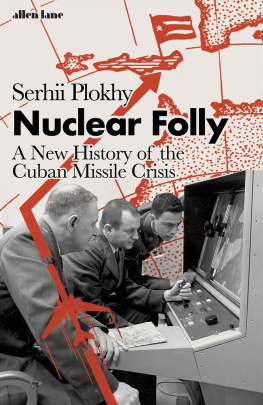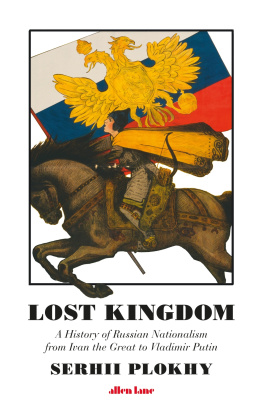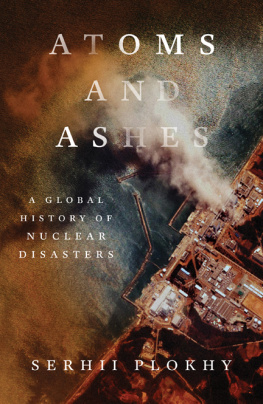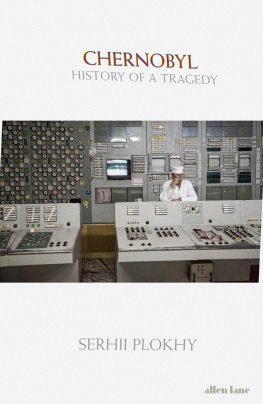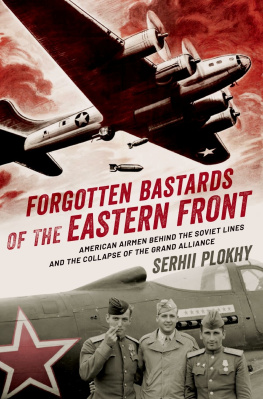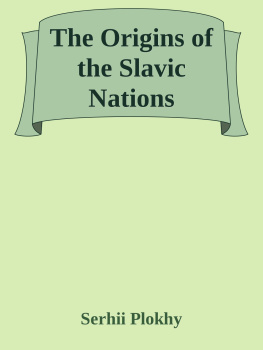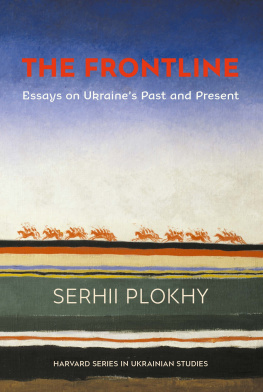Serhii Plokhy - Nuclear Folly
Here you can read online Serhii Plokhy - Nuclear Folly full text of the book (entire story) in english for free. Download pdf and epub, get meaning, cover and reviews about this ebook. year: 2021, publisher: Penguin Books Ltd, genre: Politics. Description of the work, (preface) as well as reviews are available. Best literature library LitArk.com created for fans of good reading and offers a wide selection of genres:
Romance novel
Science fiction
Adventure
Detective
Science
History
Home and family
Prose
Art
Politics
Computer
Non-fiction
Religion
Business
Children
Humor
Choose a favorite category and find really read worthwhile books. Enjoy immersion in the world of imagination, feel the emotions of the characters or learn something new for yourself, make an fascinating discovery.
- Book:Nuclear Folly
- Author:
- Publisher:Penguin Books Ltd
- Genre:
- Year:2021
- Rating:5 / 5
- Favourites:Add to favourites
- Your mark:
- 100
- 1
- 2
- 3
- 4
- 5
Nuclear Folly: summary, description and annotation
We offer to read an annotation, description, summary or preface (depends on what the author of the book "Nuclear Folly" wrote himself). If you haven't found the necessary information about the book — write in the comments, we will try to find it.
Nuclear Folly — read online for free the complete book (whole text) full work
Below is the text of the book, divided by pages. System saving the place of the last page read, allows you to conveniently read the book "Nuclear Folly" online for free, without having to search again every time where you left off. Put a bookmark, and you can go to the page where you finished reading at any time.
Font size:
Interval:
Bookmark:


Serhii Plokhy is Professor of History at Harvard University and a leading authority on Eastern Europe. His books include Baillie Gifford winner Chernobyl: History of a Tragedy, Lost Kingdom, The Gates of Europe and The Last Empire.
To those who had the courage to step back
Today, every inhabitant of this planet must contemplate the day when this planet may no longer be habitable. Every man, woman and child lives under a nuclear sword of Damocles, hanging by the slenderest of threads, capable of being cut at any moment by accident or miscalculation or by madness.
J OHN F. K ENNEDY , S EPTEMBER 1961
Of course, I was scared. It would have been insane not to be scared, I was frightened about what could happen to my country and all the countries that would be devastated by a nuclear war. If being frightened meant that I helped avert such insanity, then Im glad I was frightened. One of the problems in the world today is that not enough people are sufficiently frightened by danger of nuclear war.
N IKITA K HRUSHCHEV , D ECEMBER 1962



Robert McNamara could not believe what he had just heard. According to a witness, he had to hold on to a table to steady himself after he absorbed the news. It was January 9, 1992, and McNamara, the seventy-five-year-old former secretary of defense under John F. Kennedy and Lyndon B. Johnson, was now in Havana attending a conference on its history, in which he had been a key participant.
In attendance were Fidel Castro and some other prominent participants in the events from the United States, Cuba, and the recently defunct Soviet Union. At the podium was General Anatoly Gribkov, the former commander of the Warsaw Pact military forces and, before that, one of the key planners of the Soviet deployment in Cuba in 1962. What shocked McNamara was Gribkovs matter-of-fact remark that the Soviets had managed to deploy forty-three thousand men on the island in the summer and fall of 1962. McNamara and his military experts had been sure that there could be no more than ten thousand Soviet troops in Cuba. That was the number on which they were basing their decision whether to strike the Soviet installations and invade the island.
But that was only the first shocking revelation. Gribkov also calmly stated that apart from their huge troop concentration, antiaircraft weapons, bombers, and medium-range missiles capable of striking the United States with nuclear warheads, the Soviets had on the island tactical nuclear weapons that the Americans knew nothing about. There were six Luna (US designation Frog) missile launchers with nine missiles and nuclear warheads. These were short-range missiles that could not reach Florida but could have been used against an American invasion force with devastating consequences. Each nuclear warhead had an explosive power of 6 to 12 kilotons of TNT, only slightly less than the 15-kiloton nuclear bomb dropped on Hiroshima in August 1945. On top of that, as McNamara learned, at one stage of the crisis it was up to the Soviet commander in the field to decide whether to use the Luna missiles or not.
We didnt believe there were nuclear warheads in Cuba, commented McNamara a few days later. There was no evidence of nuclear warheads. Arthur M. Schlesinger Jr., a former special assistant to President Kennedy and McNamaras fellow participant at the conference, was equally taken aback. He recalled that Gribkovs revelations had startled and appalled the Americans. Incredible, wrote Schlesinger, remembering his own reaction to the news. I had earlier believed that we had overestimated the dangers of the crisisthat Khrushchev, well aware of US overall nuclear superiority as well as of US conventional superiority in the Caribbean, would never have risked war. But Soviet forces, we are now told, were ready to fire tactical nuclear missiles at an invading force.
A few hours earlier McNamara told the conference that the actions of the three main actors in the Cuban missile crisis had been distorted by misinformation, miscalculation, and misperceptions. But even he had not realized the depth of those misunderstandings and misperceptions. That was horrifying. It meant that had a U.S. invasion been carried out, if the missiles had not been pulled out, there was a 99 percent probability that nuclear war would have been initiated, McNamara told a reporter.

John Fitzgerald Kennedy cut an impressive figure on the cold Washington day of his inauguration, January 20, 1961. Tall and erect, despite his back problems, dressed in a tailcoat as everyone around him wore a winter coat, he projected youth, energy, optimism, and determination. The youngest person ever elected president of the United Stateshe was only forty-three years oldleft no doubt by his looks and words that he was ready to chart a new course for his country and the world, not just for the duration of his presidency but for decades ahead.
Leadership was passing from one generation to another, the transition captured by cameras as the gray, balding, and warmly dressed outgoing president, Dwight Eisenhower, accompanied his young successor to the ceremony in the same automobile and then shook his hand after the swearing-in. Eisenhower, a war hero and one of the most successful presidents in American history, was seventy at the time. But he was not the oldest man in attendance. To greet the new president and pass the torch of moral leadership came the eighty-six-year-old dean of American literature, Robert Frost. Kennedy wanted him to take part in the ceremony, and Frost accepted the invitation: If you can bear at your age the honor of being made president of the United States, I ought to be able at my age to bear the honor of taking some part in your inauguration.
Frost appreciated the challenges that Kennedy would face as president but counted on his youth as an asset, envisioning a glorious age for his country modeled on the era of the first Roman emperor, Augustus. It would be an age of peace, tranquility, and an alliance of power with culture. In a dedicatory poem he wrote specifically for the inauguration but never read, as he was blinded by light reflected from the snow that had fallen on Washington the previous night, Frost heralded The glory of a next Augustan age / Of a power leading from its strength and pride / Of young ambition eager to be tried / Firm in our free beliefs without dismay / In any game the nations want to play.
If Frost had a bold vision but lacked good eyesight, the much younger Kennedy possessed both. His inauguration speech became one of the best known texts in American political history, making its way into elementary school classrooms all over the country. According to the website of the JFK Presidential Library and Museum, the most memorable line of the speech, ask not what your country can do for youask what you can do for your country, inspired children and adults to see the importance of civic action and public service. Indeed, it did. But public service at home was not at the center of Kennedys attention. Sacrifice abroad in the pursuit of Robert Frosts Augustan age was. [W]e shall pay any price, bear any burden, meet any hardship, support any friend, oppose any foe to assure the survival and success of liberty, declared Kennedy. His speech was largely dedicated to world politics. The great social turmoil of the 1960s was still ahead; the current preoccupation was the scare caused by the Soviet Sputnik and communist advances in Asia, Africa, and, most recently, in Latin America.
Next pageFont size:
Interval:
Bookmark:
Similar books «Nuclear Folly»
Look at similar books to Nuclear Folly. We have selected literature similar in name and meaning in the hope of providing readers with more options to find new, interesting, not yet read works.
Discussion, reviews of the book Nuclear Folly and just readers' own opinions. Leave your comments, write what you think about the work, its meaning or the main characters. Specify what exactly you liked and what you didn't like, and why you think so.

